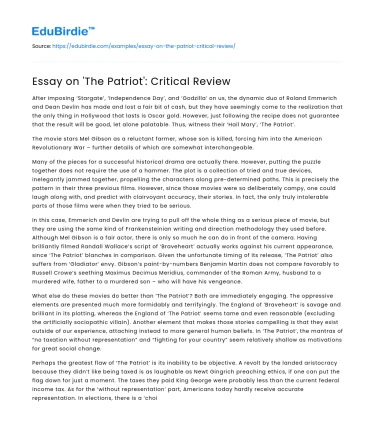After imposing ‘Stargate’, ‘Independence Day’, and ‘Godzilla’ on us, the dynamic duo of Roland Emmerich and Dean Devlin has made and lost a fair bit of cash, but they have seemingly come to the realization that the only thing in Hollywood that lasts is Oscar gold. However, just following the recipe does not guarantee that the result will be good, let alone palatable. Thus, witness their ‘Hail Mary’, ‘The Patriot’.
The movie stars Mel Gibson as a reluctant farmer, whose son is killed, forcing him into the American Revolutionary War – further details of which are somewhat interchangeable.
Save your time!
We can take care of your essay
- Proper editing and formatting
- Free revision, title page, and bibliography
- Flexible prices and money-back guarantee
Many of the pieces for a successful historical drama are actually there. However, putting the puzzle together does not require the use of a hammer. The plot is a collection of tried and true devices, inelegantly jammed together, propelling the characters along pre-determined paths. This is precisely the pattern in their three previous films. However, since those movies were so deliberately campy, one could laugh along with, and predict with clairvoyant accuracy, their stories. In fact, the only truly intolerable parts of those films were when they tried to be serious.
In this case, Emmerich and Devlin are trying to pull off the whole thing as a serious piece of movie, but they are using the same kind of Frankensteinian writing and direction methodology they used before. Although Mel Gibson is a fair actor, there is only so much he can do in front of the camera. Having brilliantly filmed Randall Wallace’s script of ‘Braveheart’ actually works against his current appearance, since ‘The Patriot’ blanches in comparison. Given the unfortunate timing of its release, ‘The Patriot’ also suffers from ‘Gladiator’ envy. Gibson’s paint-by-numbers Benjamin Martin does not compare favorably to Russell Crowe’s seething Maximus Decimus Meridius, commander of the Roman Army, husband to a murdered wife, father to a murdered son – who will have his vengeance.
What else do these movies do better than ‘The Patriot’? Both are immediately engaging. The oppressive elements are presented much more formidably and terrifyingly. The England of ‘Braveheart’ is savage and brilliant in its plotting, whereas the England of ‘The Patriot’ seems tame and even reasonable (excluding the artificially sociopathic villain). Another element that makes those stories compelling is that they exist outside of our experience, attaching instead to more general human beliefs. In ‘The Patriot’, the mantras of “no taxation without representation” and “fighting for your country” seem relatively shallow as motivations for great social change.
Perhaps the greatest flaw of ‘The Patriot’ is its inability to be objective. A revolt by the landed aristocracy because they didn’t like being taxed is as laughable as Newt Gingrich preaching ethics, if one can put the flag down for just a moment. The taxes they paid King George were probably less than the current federal income tax. As for the ‘without representation’ part, Americans today hardly receive accurate representation. In elections, there is a ‘choice’ of two candidates for virtually any given elected position, and their positions are dedicated more by overlapping interest groups, rather than the needs and desires of their constituency. However, the average clear-thinking American does not join a militia against the government, or blow-up ships -- or buildings as the case might be.
The greatness of the ‘American way of life’ is written in the softest of soft focus in order to blur the wrinkles in its rosy façade. For example, Gibson’s militia accepts a black soldier reluctantly at first, but he predictably saves the life of the most prejudiced member. Discussion of building a new world for black people follows, although the US government would not change that situation for another century, with American society twiddling its thumbs a century more. The added irony of this is that England had already beaten the ‘land of the free’ to abolishing slavery, prior to the events in the movie.
Furthermore, Lord Cornwallis’ final lament about England’s empire coming to an end could have equally been directed at the empire of the United States. The opportunity to draw a comparison between what England was then to what America is now was missed entirely by Emmerich and Devlin, although subtlety and clarity cannot honestly be expected from these two. They would rather have Mel Gibson trot the star spangled banner around, ‘Dances With Wolves’ style, and then have him lower it to skewer hapless redcoats.






 Stuck on your essay?
Stuck on your essay?

